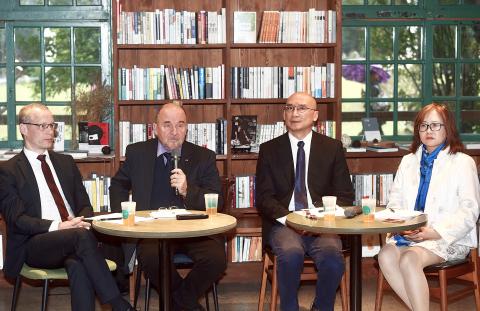Leaders of a German government-funded foundation tasked with assessing the legacy of the German Democratic Republic (GDR) yesterday stressed the importance of dialogue, education and preservation of memories when dealing with a country’s authoritarian past, after the legislature last month passed the Act on Promoting Transitional Justice (促進轉型正義條例).
Federal Foundation for the Study of Communist Dictatorship in East Germany chairman Rainer Eppelmann and foundation deputy director Robert Gruenbaum discussed their country’s experience of handling the Socialist Unity Party of Germany and its illegally obtained assets at a public forum in Taipei at the invitation of the Executive Yuan’s Ill-gotten Party Assets Settlement Committee.
The foundation was established in 1998 by the Bundestag to clarify historical truths and promote human rights education.

Photo: Chien Jung-fong, Taipei Times
Eppelmann, who spent the first 46 years of his life living under East Germany’s authoritarian regime, said it is imperative to legally restore the reputation of political victims, but it is equally important to let them tell their stories and share their experiences.
“The purpose of doing so is to prevent people today and tomorrow from committing the same mistakes and to preserve the memories of what happened in the past,” Eppelmann said.
Dialogue with the perpetrators is a must, as most of them have been living with the fear that others will find out about who they once were and will do to them what they used to do to others.
That is why efforts should be made to let perpetrators know that people are not looking for retaliation, but rather seeking an explanation and a sincere apology, he said.
“People living in the same society must talk to each other and explain themselves. Otherwise, how could we live together?” he said.
At a time when more people than ever are born in democratic societies and take democracy for granted, it is all the more important to teach people about authoritarianism and the values of democracy, Eppelmann said.
Younger Germans do not have any any experience of the country’s auhoritarian past, so the government has attempted to teach them what people’s lives used to be like, Gruenbaum said.
“It is vital to incorporate history about East Germany into college education, because only when college students have a clear understanding of that part of history can they pass the knowledge onto the next generation,” Gruenbaum said.
The forum was overshadowed by members of the Chinese Nationalist Party (KMT) protesting against government efforts to recover the party’s illegitimately gained assets and remove past authoritarian symbols. Eppelmann was asked how such protests should be dealt with.
“Protests are normal, as long as they are not violent,” he said.
Eppelmann from Monday to yesterday led a three-member delegation to Taiwan, which met with officials from the assets committee, the Ministry of the Interior, the Ministry of Culture and the Mainland Affairs Council.
They also visited sites of cultural significance, including Chiang Kai-shek Memorial Hall and the National 228 Memorial Museum.

ANOTHER EMERGES: The CWA yesterday said this year’s fourth storm of the typhoon season had formed in the South China Sea, but was not expected to affect Taiwan Tropical Storm Gaemi has intensified slightly as it heads toward Taiwan, where it is expected to affect the country in the coming days, the Central Weather Administration (CWA) said yesterday. As of 8am yesterday, the 120km-radius storm was 800km southeast of Oluanpi (鵝鑾鼻), Taiwan’s southernmost tip, moving at 9kph northwest, the agency said. A sea warning for Gaemi could be issued tonight at the earliest, it said, adding that the storm is projected to be closest to Taiwan on Wednesday or Thursday. Gaemi’s potential effect on Taiwan remains unclear, as that would depend on its direction, radius and intensity, forecasters said. Former Weather Forecast

As COVID-19 cases in Japan have been increasing for 10 consecutive weeks, people should get vaccinated before visiting the nation, the Centers for Disease Control (CDC) said. The centers reported 773 hospitalizations and 124 deaths related to COVID-19 in Taiwan last week. CDC Epidemic Intelligence Center Director Guo Hung-wei (郭宏偉) on Tuesday said the number of weekly COVID-19 cases reported in Japan has been increasing since mid-May and surpassed 55,000 cases from July 8 to July 14. The average number of COVID-19 patients at Japan’s healthcare facilities that week was also 1.39 times that of the week before and KP.3 is the dominant

The Chinese Communist Party’s (CCP) working group for Taiwan-related policies is likely to be upgraded to a committee-level body, a report commissioned by the Mainland Affairs Council (MAC) said. As Chinese President Xi Jinping (習近平) is increasingly likely to upgrade the CCP’s Central Leading Group for Taiwan Affairs, Taiwanese authorities should prepare by researching Xi and the CCP, the report said. At the third plenary session of the 20th Central Committee of the CCP, which ended on Thursday last week, the party set a target of 2029 for the completion of some tasks, meaning that Xi is likely preparing to

US-CHINA TRADE DISPUTE: Despite Beijing’s offer of preferential treatment, the lure of China has dimmed as Taiwanese and international investors move out Japan and the US have become the favored destinations for Taiwanese graduates as China’s attraction has waned over the years, the Ministry of Labor said. According to the ministry’s latest income and employment advisory published this month, 3,215 Taiwanese university graduates from the class of 2020 went to Japan, surpassing for the first time the 2,881 graduates who went to China. A total of 2,300 graduates from the class of 2021 went to the US, compared with the 2,262 who went to China, the document showed. The trend continued for the class of 2023, of whom 1,460 went to Japan, 1,334 went to